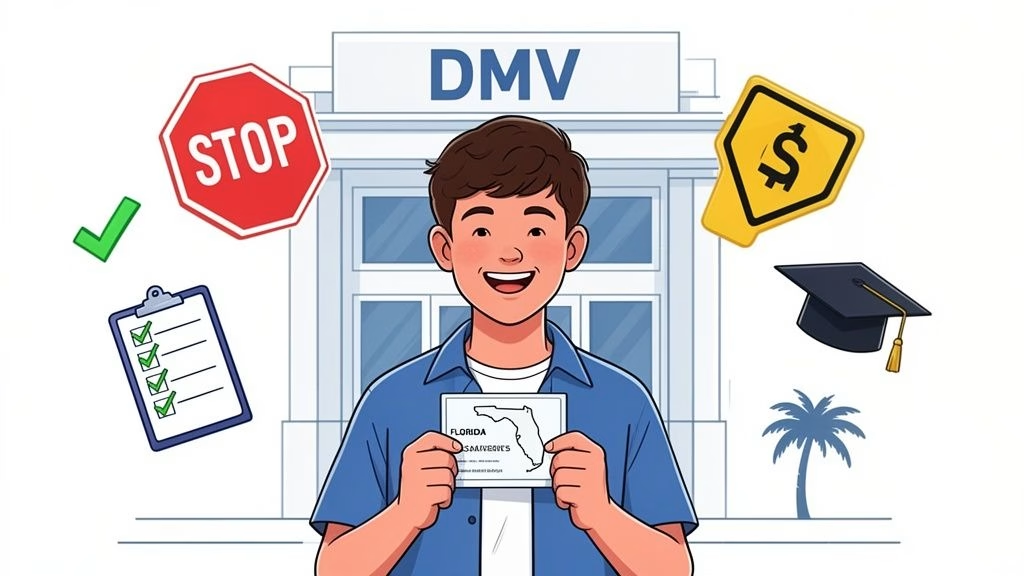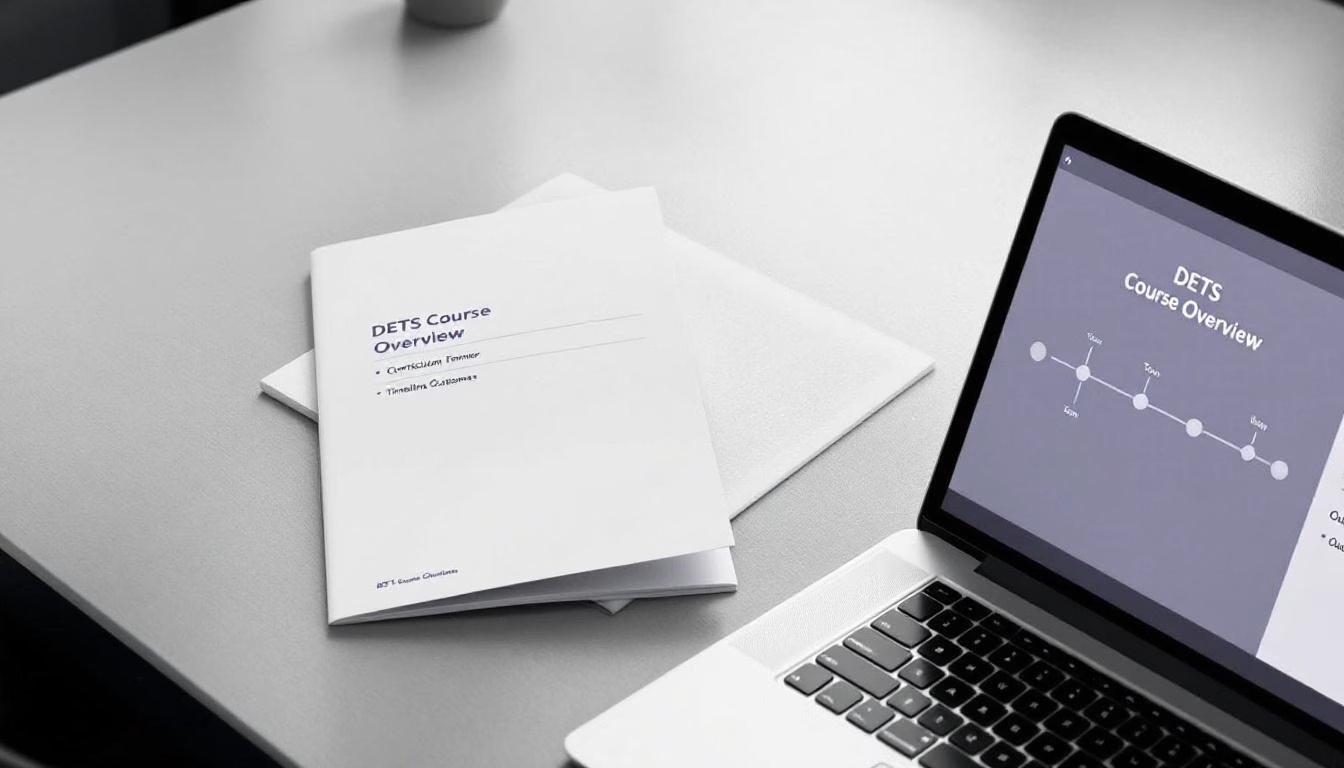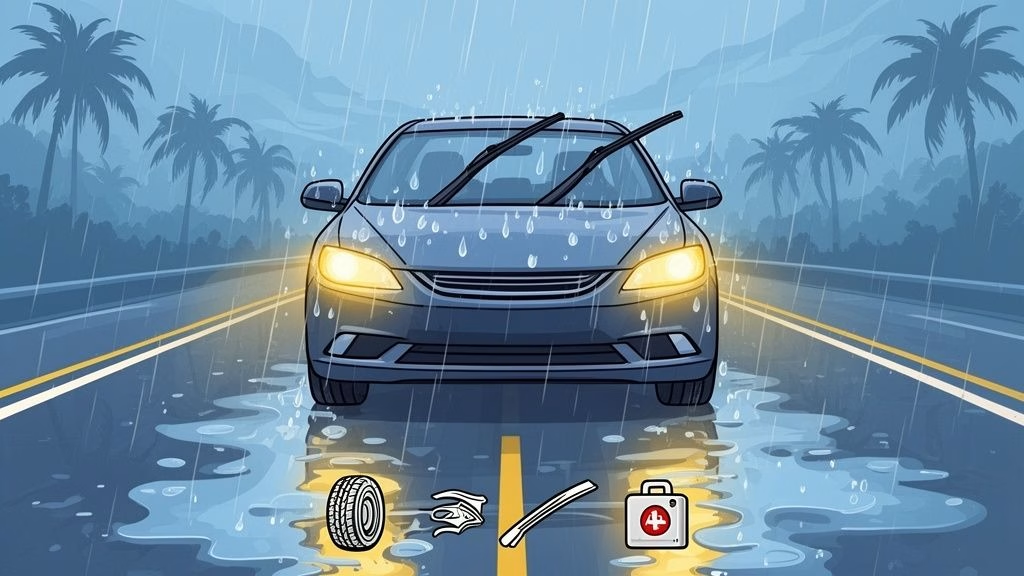Getting a speeding ticket doesn’t have to derail your driving record or drain your wallet. Online traffic school for speeding tickets offers a convenient way to dismiss violations and avoid insurance rate increases.
We at floridanewdriver.com know that 41 million Americans receive speeding tickets annually, making online courses a popular solution. Most states now accept online completion, saving drivers time and money compared to traditional classroom attendance.
How Does Online Traffic School Work for Speeding Tickets
Online traffic school functions as a digital classroom where drivers complete state-mandated courses to dismiss speeding tickets and avoid insurance penalties. Students log into approved platforms, progress through interactive modules that cover traffic laws and safe driving practices, then pass a final exam to receive completion certificates.
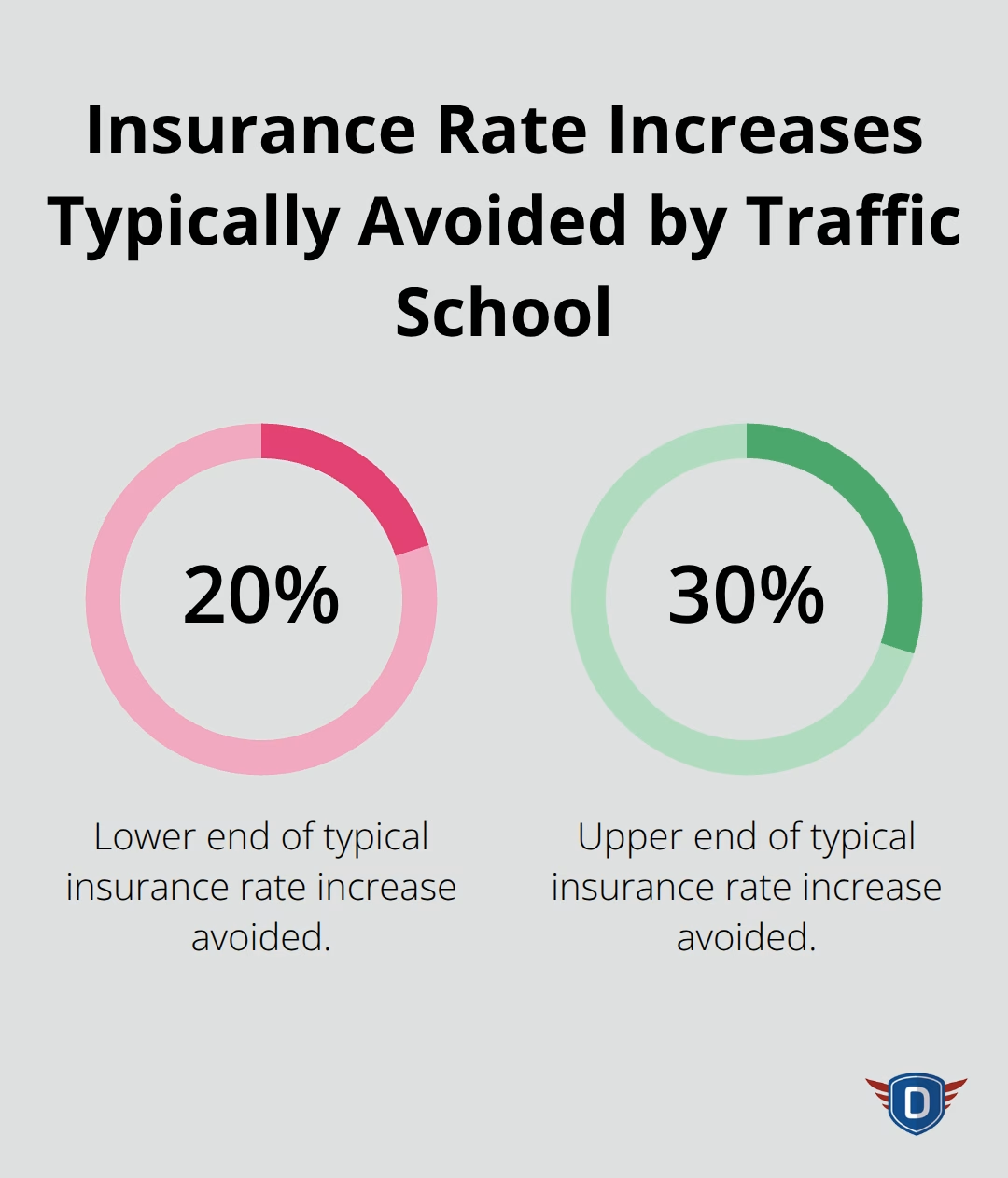
Eligibility Standards You Must Meet
Most states require drivers to hold valid non-commercial licenses and receive only minor violations to qualify for traffic school. California restricts eligibility to drivers who haven’t attended traffic school within the previous 18 months and received one-point violations. Serious offenses like reckless driving or DUI convictions automatically disqualify applicants. The violation must typically involve speeds under 25 mph over the limit (though specific thresholds vary by jurisdiction).
Why Online Beats Classroom Attendance
Online traffic school delivers superior convenience and completion rates compared to traditional classroom settings. Students complete courses in 2-3 hours at their own pace rather than spend entire weekends in physical locations. Best online traffic school providers show that classroom instruction leads to significantly higher written test pass rates compared to other formats. The cost difference is substantial too – online courses range from $20-50 while classroom sessions often exceed $100 when you factor in time off work and transportation expenses.
Course Structure and Requirements
State-approved online programs include interactive content, quizzes, and visual aids that improve retention of traffic safety concepts. Students access materials on smartphones, tablets, or computers with unlimited login attempts and 24/7 availability. The final exam typically contains 25 questions with open-book format, and most providers offer unlimited retakes without additional fees. Schools automatically submit certificates to courts and DMV offices upon successful completion (which eliminates paperwork hassles for students).
Steps to Get Started
The enrollment process requires specific documentation and payment methods that vary between providers and states. You’ll need your citation number, driver’s license information, and court details to register for most programs.
How to Enroll in Online Traffic School
Find State-Approved Programs
Start your search with your state’s DMV website, which maintains lists of approved online traffic school providers. California drivers can choose from over 50 state-licensed programs, while Texas offers approximately 30 certified options. Avoid unlicensed schools that won’t submit completion certificates to courts – drivers who choose unapproved programs face significant risks and may need to retake courses through legitimate providers.
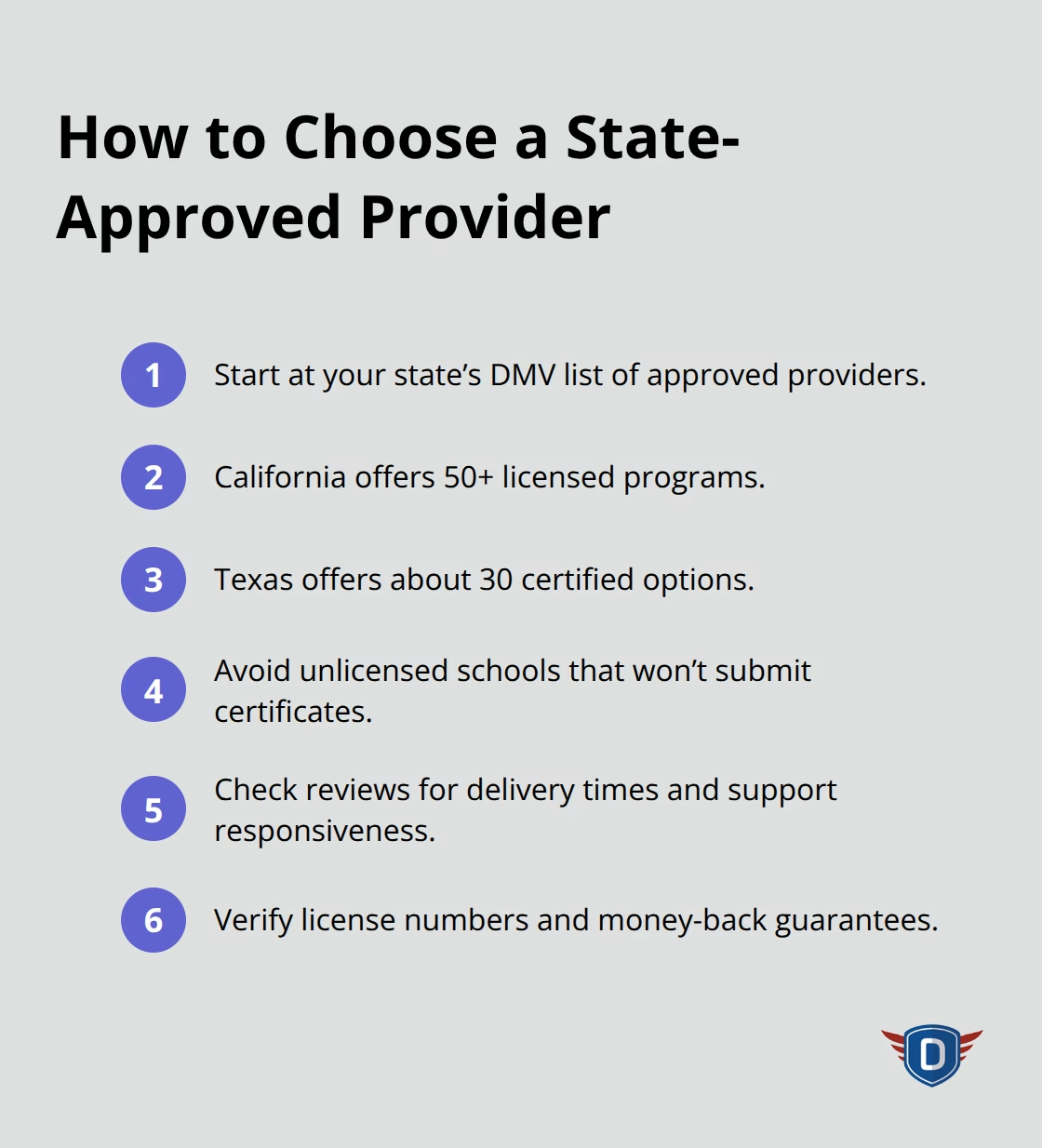
Check provider ratings on consumer review sites, focus on completion certificate delivery times and customer service responsiveness. Verify that schools display current state license numbers prominently on their websites and offer money-back guarantees for course completion.
Prepare Required Documents
Gather your traffic citation number, driver’s license number, court name, and violation date before you start the process. Most providers require immediate payment (which ranges from $20 to $79), with premium schools like $5 Dollar Traffic School charging exactly $6 including certificate fees. Payment options typically include credit cards, PayPal, and sometimes payment plans for courses exceeding $50.
The National Association of Traffic Safety Education reports that 92% of students complete the process within 10 minutes when documents are prepared in advance. Avoid schools that request Social Security numbers or excessive personal information beyond basic license verification requirements.
Understand Course Fees and Additional Costs
Online traffic school costs vary dramatically between states and providers, with California courses averaging $60 while Florida programs cost approximately $25. Premium providers often include unlimited exam retakes, mobile access, and expedited certificate processing in base fees. Watch for hidden charges like processing fees, certificate printing costs, or rush delivery options that can double total expenses.
Young drivers typically see 5-15% savings on insurance premiums after they complete traffic school, which can amount to hundreds of dollars annually given their higher base premiums. Compare total costs including court administrative fees (which range from $49 to $79 in most jurisdictions) when you calculate your investment.
Once you complete enrollment and payment, you’ll gain immediate access to course materials and can begin your traffic school education at your own pace.
How Long Does Online Traffic School Take
Most online traffic school courses require 4-8 hours of study time, though state regulations set minimum completion periods rather than maximum limits. California mandates courses last at least 8 hours, while Texas requires 6 hours minimum regardless of how quickly students absorb material. The National Safety Council found that drivers under 21 achieved a 68% decrease in violation rates through online training, with average completion times of 3-4 hours for focused learners. Students can pause progress indefinitely and return later, which makes the process flexible for busy schedules.
State-Specific Time Requirements
Different states impose varying minimum duration requirements that schools must follow. Florida requires 4 hours minimum completion time, while New York mandates 6 hours for point reduction courses. These regulations prevent students from rushing through material too quickly, which helps maintain educational value. Schools track actual time spent on course materials and prevent advancement until minimum requirements are met (even if students finish reading earlier).
Course Pacing and Flexibility
Online platforms allow students to work at their own speed within state-mandated timeframes. Most providers break courses into short modules that take 15-30 minutes each, making it easy to fit study sessions into daily routines. Students can log out at any point and resume exactly where they left off, with progress automatically saved. This flexibility proves especially valuable for working professionals who need to complete courses around job schedules.
Final Exam Structure and Requirements
The final exam typically contains 25-50 multiple choice questions that cover traffic laws, defensive techniques, and penalty information from course materials. Most states require 70% scores to pass, though some jurisdictions like Florida demand 80% accuracy. Students receive unlimited retake opportunities at reputable schools, with open-book formats that allow reference to course content during tests.
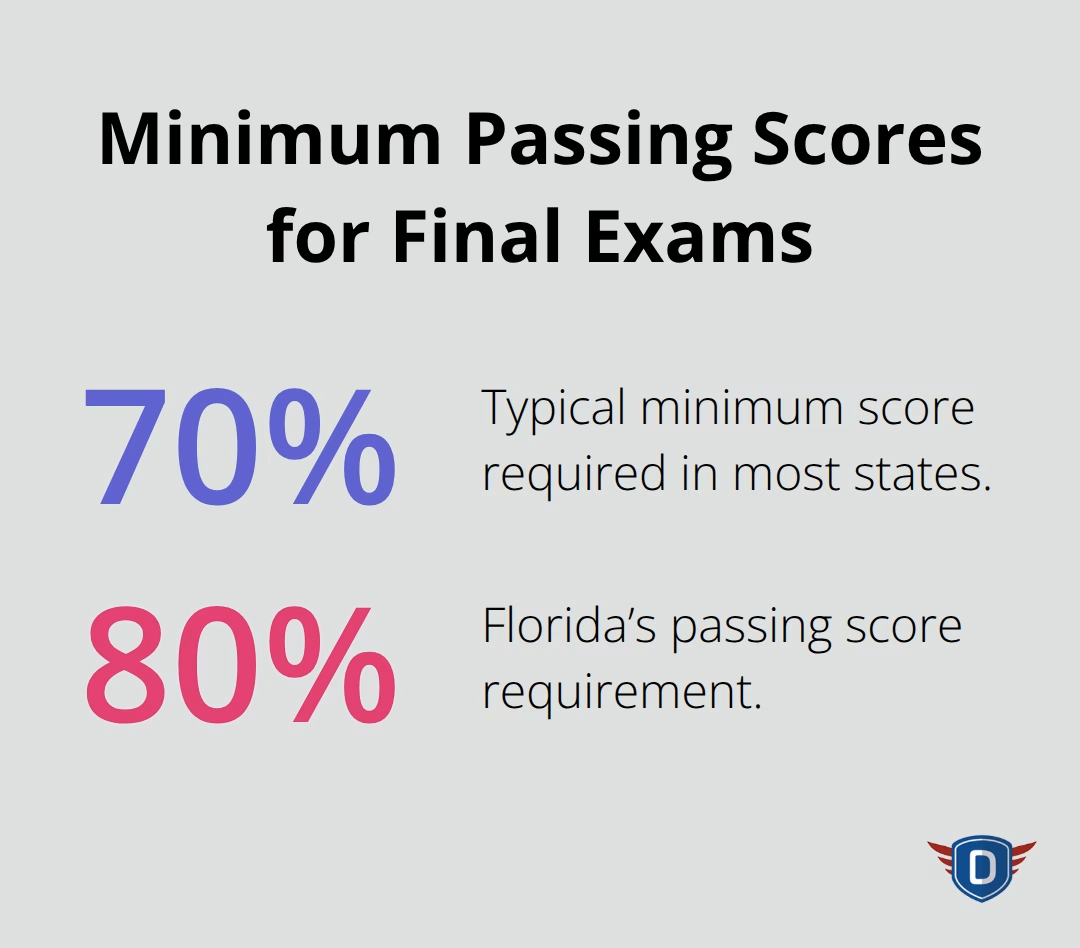
Certificate Processing and Court Submission
Approved schools automatically submit completion certificates to courts and DMV offices within 24-48 hours after successful exam completion. Students receive confirmation emails with tracking numbers and estimated processing dates for their specific jurisdictions. California courts process traffic school certificates within 10 business days, while Texas typically completes updates within 5 days according to state transportation departments. Some providers offer expedited processing for additional fees, though standard delivery meets court deadlines in 99% of cases.
Final Thoughts
Online traffic school for speeding tickets delivers measurable benefits that extend far beyond simple violation dismissal. The 20-30% insurance rate increase that typically follows speeding convictions costs drivers over $1,000 annually for three years, which makes the $20-79 course investment a smart financial decision. Students gain updated knowledge of current traffic laws and defensive techniques that reduce future violation risks by up to 68% according to National Safety Council data.
Court deadlines remain absolutely critical for successful ticket dismissal. Most jurisdictions require course completion within 60-90 days of citation issuance, with no extensions available after deadlines pass. Students must verify their specific court’s requirements and allow adequate processing time for certificate submission (which typically takes 24-48 hours through approved providers).
After you complete your course, monitor your record through your state’s DMV website to confirm point removal and violation masking. Insurance companies usually process rate adjustments within 30-60 days of record updates. We at floridanewdriver.com help students develop safe habits beyond basic traffic school requirements through comprehensive programs that create confident drivers who navigate roads safely.

![Online Traffic School for a Speeding Ticket [2025 Guide]](https://floridanewdriver.com/wp-content/uploads/emplibot/online-traffic-school-for-speeding-ticket-hero-1760756881.avif)
